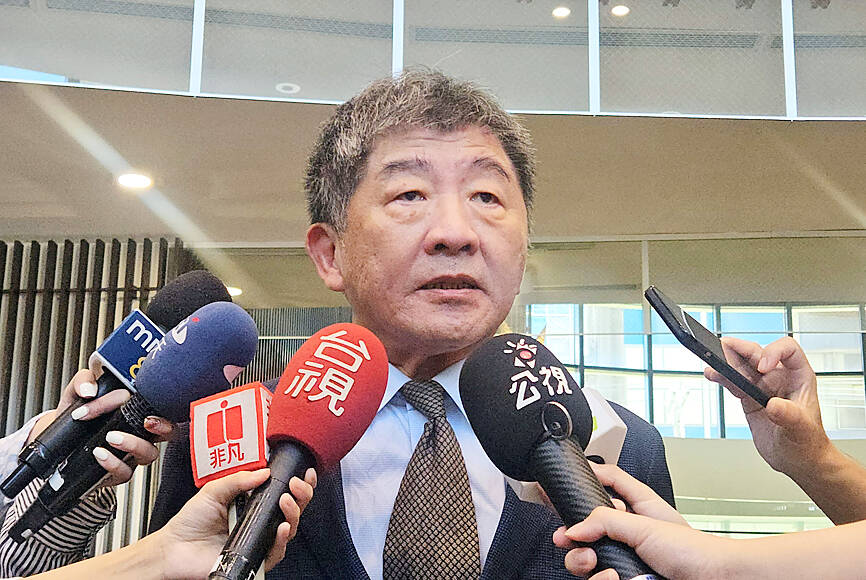The government is dedicated to improving the nation’s low birthrate and plans to offer a monthly baby bonus are being discussed, Premier Cho Jung-tai (卓榮泰) said yesterday morning, adding that a report that the monthly incentive would be set at NT$30,000 (US$913) is not final.
Minister Without Portfolio Chen Shih-chung (陳時中) said in an interview published yesterday in the Chinese-language United Daily News that the government is formulating a birth subsidy program that would provide a monthly bonus of about NT$30,000 for each baby until they reach kindergarten age.
When asked about Chen’s proposal, Cho said during a visit to Pingtung County that the government has continued to invest in solutions to solve the birthrate problem, such as offering more public childcare services, while the birth subsidy program is being planned.

Photo: CNA
“I requested Minister Chen to gather information and conceive an initial plan based on reasonable calculations — not that we could come up with an exact number immediately,” he said.
A monthly bonus of NT$30,000 is an estimate that needs further discussion, he added.
The goal of the birth subsidy is to encourage young people to have children without being burdened by financial concerns, but the government “has yet to reach the stage” of finalizing the exact amount of the subsidy and its implementation timeline, the premier said.
In the interview, Chen said that many Taiwanese dare not have children due to concerns over the financial burden.
While the government’s subsidy policies used to be indirect, a larger baby bonus remitted directly to personal bank accounts could incentivize people to have more children, he was quoted as saying in the interview.
For example, Hungary used to have a sub-replacement fertility rate of 1.1, but this has risen to 1.6 in recent years after a cash subsidy went into effect, he said.
The Healthy Taiwan Promotion Committee estimates that a monthly bonus of NT$30,000 for each of the approximately 130,000 newborns each year would result in a monthly expenditure of NT$3.9 billion or require an annual budget of nearly NT$50 billion, he said.
The amount is seemingly massive, but still less than one-fourth of the recommended amount for childcare subsidies, which should be NT$200 billion in Taiwan, making up 2 percent of GDP, it reported Chen as saying.
Meanwhile, Minister of Health and Welfare Chiu Tai-yuan (邱泰源) yesterday said that any proposal that helps implement the government’s childcare policy is worth discussing.
Democratic Progressive Party Legislator Lin Yueh-chin (林月琴) said that generous birth subsidies could help boost the birthrate, as many of her female acquaintances have said they are willing to have children if the monthly baby bonus is set at NT$30,000.
Aside from the cash subsidy, providing high-quality kindergartens and infant care centers are also important, so that parents could go to work without worries, she said.

A magnitude 5.6 earthquake struck off the coast of Yilan County at 12:37pm today, with clear shaking felt across much of northern Taiwan. There were no immediate reports of damage. The epicenter of the quake was 16.9km east-southeast of Yilan County Hall offshore at a depth of 66.8km, Central Weather Administration (CWA) data showed. The maximum intensity registered at a 4 in Yilan County’s Nanao Township (南澳) on Taiwan’s seven-tier scale. Other parts of Yilan, as well as certain areas of Hualien County, Taipei, New Taipei City, Taoyuan, Hsinchu County, Taichung and Miaoli County, recorded intensities of 3. Residents of Yilan County and Taipei received

Taiwan has secured another breakthrough in fruit exports, with jujubes, dragon fruit and lychees approved for shipment to the EU, the Ministry of Agriculture said yesterday. The Animal and Plant Health Inspection Agency on Thursday received formal notification of the approval from the EU, the ministry said, adding that the decision was expected to expand Taiwanese fruit producers’ access to high-end European markets. Taiwan exported 126 tonnes of lychees last year, valued at US$1.48 million, with Japan accounting for 102 tonnes. Other export destinations included New Zealand, Hong Kong, the US and Australia, ministry data showed. Jujube exports totaled 103 tonnes, valued at

TRUST: The KMT said it respected the US’ timing and considerations, and hoped it would continue to honor its commitments to helping Taiwan bolster its defenses and deterrence US President Donald Trump is delaying a multibillion-dollar arms sale to Taiwan to ensure his visit to Beijing is successful, a New York Times report said. The weapons sales package has stalled in the US Department of State, the report said, citing US officials it did not identify. The White House has told agencies not to push forward ahead of Trump’s meeting with Chinese President Xi Jinping (習近平), it said. The two last month held a phone call to discuss trade and geopolitical flashpoints ahead of the summit. Xi raised the Taiwan issue and urged the US to handle arms sales to

BIG SPENDERS: Foreign investors bought the most Taiwan equities since 2005, signaling confidence that an AI boom would continue to benefit chipmakers Taiwan Semiconductor Manufacturing Co’s (TSMC, 台積電) market capitalization swelled to US$2 trillion for the first time following a 4.25 percent rally in its American depositary receipts (ADR) overnight, putting the world’s biggest contract chipmaker sixth on the list of the world’s biggest companies by market capitalization, just behind Amazon.com Inc. The site CompaniesMarketcap.com ranked TSMC ahead of Saudi Aramco and Meta Platforms Inc. The Taiwanese company’s ADRs on Tuesday surged to US$385.75 on the New York Stock Exchange, as strong demand for artificial intelligence (AI) applications led to chip supply constraints and boost revenue growth to record-breaking levels. Each TSMC ADR represents